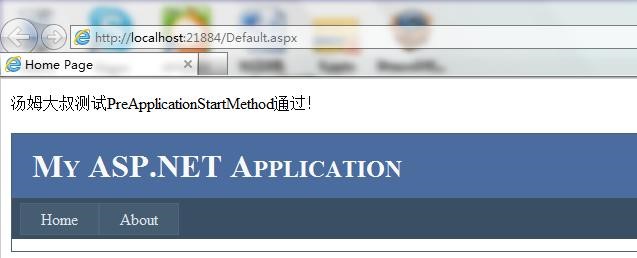文章內容
通過前面的章節,我們知道HttpApplication在初始化的時候會初始化所有配置檔案裡註冊的HttpModules,那麼有一個疑問,能否初始化之前動態載入HttpModule,而不是隻從Web.config裡讀取?
答案是肯定的, ASP.NET MVC3釋出的時候提供了一個Microsoft.Web.Infrastructure.dll檔案,這個檔案就是提供了動態註冊HttpModule的功能,那麼它是如何以註冊的呢?我們先去MVC3的原始碼看看該DLL的原始碼。
注:該DLL位置在C:\Program Files\Microsoft ASP.NET\ASP.NET Web Pages\v1.0\Assemblies\下
我們發現了一個靜態類DynamicModuleUtility,裡面有個RegisterModule方法引起了我的注意:
// Call from PreAppStart to dynamically register an IHttpModule, just as if you had added it to the // <modules> section in Web.config. [SecuritySafeCritical] public static void RegisterModule(Type moduleType) { if (DynamicModuleReflectionUtil.Fx45RegisterModuleDelegate != null) { // The Fx45 helper exists, so just call it directly. DynamicModuleReflectionUtil.Fx45RegisterModuleDelegate(moduleType); } else { // Use private reflection to perform the hookup. LegacyModuleRegistrar.RegisterModule(moduleType); } }
通過程式碼和註釋我們可以看到,這個方法就是讓我們動態註冊IHttpModule的,而且由於.Net4.5已經有helper類支援了,所以直接就可以用,其它版本使用LegacyModuleRegistrar.RegisterModule來動態註冊IHttpModule 的。而這個方法裡又分IIS6和IIS7整合或經典模式之分,程式碼大體上是一致的,我們這裡就只分析IIS6版本的程式碼:
private static void AddModuleToClassicPipeline(Type moduleType) { // This works by essentially adding a new entry to the <httpModules> section defined // in ~/Web.config. Need to set the collection to read+write while we do this. // httpModulesSection = RuntimeConfig.GetAppConfig().HttpModules; // httpModulesSection.Modules.bReadOnly = false; // httpModulesSection.Modules.Add(new HttpModuleAction(...)); // httpModulesSection.Modules.bReadOnly = true; HttpModulesSection httpModulesSection = null; try { object appConfig = _reflectionUtil.GetAppConfig(); httpModulesSection = _reflectionUtil.GetHttpModulesFromAppConfig(appConfig); _reflectionUtil.SetConfigurationElementCollectionReadOnlyBit(httpModulesSection.Modules, false /* value */); DynamicModuleRegistryEntry newEntry = CreateDynamicModuleRegistryEntry(moduleType); httpModulesSection.Modules.Add(new HttpModuleAction(newEntry.Name, newEntry.Type)); } finally { if (httpModulesSection != null) { _reflectionUtil.SetConfigurationElementCollectionReadOnlyBit(httpModulesSection.Modules, true /* value */); } } }
上面程式碼的註釋非常重要,通過註釋我們可以看到,該方法先從RuntimeConfig.GetAppConfig().HttpModules獲取HttpModules集合,然後在集合裡新增需要註冊的新HttpModule,那就是說HttpApplication在初始化所有HttpModule之前必須將需要註冊的HttpModule新增到這個集合裡,那是在哪個週期呢?HttpApplication之前是HostingEnvironment,那是不是在這裡可以註冊呢?我們去該類檢視一下相關的程式碼,在Initialize方法裡突然發現一個貌似很熟悉的程式碼BuildManager.CallPreStartInitMethods(),程式碼如下:
// call AppInitialize, unless the flag says not to do it (e.g. CBM scenario). // Also, don't call it if HostingInit failed (VSWhidbey 210495) if(!HttpRuntime.HostingInitFailed) { try { BuildManager.CallPreStartInitMethods(); if ((hostingFlags & HostingEnvironmentFlags.DontCallAppInitialize) == 0) { BuildManager.CallAppInitializeMethod(); } } catch (Exception e) { // could throw compilation errors in 'code' - report them with first http request HttpRuntime.InitializationException = e; if ((hostingFlags & HostingEnvironmentFlags.ThrowHostingInitErrors) != 0) { throw; } } }
通過去BuildManager類去檢視該方法的詳情,最終發現瞭如下這個方法:
internal static ICollection<MethodInfo> GetPreStartInitMethodsFromAssemblyCollection(IEnumerable<Assembly> assemblies) { List<MethodInfo> methods = new List<MethodInfo>(); foreach (Assembly assembly in assemblies) { PreApplicationStartMethodAttribute[] attributes = null; try { attributes = (PreApplicationStartMethodAttribute[])assembly.GetCustomAttributes(typeof(PreApplicationStartMethodAttribute), inherit: true); } catch { // GetCustomAttributes invokes the constructors of the attributes, so it is possible that they might throw unexpected exceptions. // (Dev10 bug 831981) } if (attributes != null && attributes.Length != 0) { Debug.Assert(attributes.Length == 1); PreApplicationStartMethodAttribute attribute = attributes[0]; Debug.Assert(attribute != null); MethodInfo method = null; // Ensure the Type on the attribute is in the same assembly as the attribute itself if (attribute.Type != null && !String.IsNullOrEmpty(attribute.MethodName) && attribute.Type.Assembly == assembly) { method = FindPreStartInitMethod(attribute.Type, attribute.MethodName); } if (method != null) { methods.Add(method); } else { throw new HttpException(SR.GetString(SR.Invalid_PreApplicationStartMethodAttribute_value, assembly.FullName, (attribute.Type != null ? attribute.Type.FullName : String.Empty), attribute.MethodName)); } } } return methods; }
發現了該方法會查詢應用程式下所有的程式集,判斷如果程式集標記為PreApplicationStartMethodAttribute特性,就會執行這個特性裡指定的方法(靜態方法),再檢查該類的程式碼:
[AttributeUsage(AttributeTargets.Assembly, AllowMultiple = false)] public sealed class PreApplicationStartMethodAttribute : Attribute { private readonly Type _type; private readonly string _methodName; public PreApplicationStartMethodAttribute(Type type, string methodName) { _type = type; _methodName = methodName; } public Type Type { get { return _type; } } public string MethodName { get { return _methodName; } } }
這時候,心裡應該有數了吧,我們可以在這裡指定一個靜態方法名稱,然後在該方法去通過如下程式碼去註冊一個自定義的HttpModule(注意我們只能使用一次):
DynamicModuleUtility.RegisterModule(typeof(CustomModule));
我們來做個試驗試試我們分析的結果是不是正確,首先建立一個自定義HttpModule,程式碼如下:
public class CustomModule : IHttpModule { public void Init(HttpApplication context) { context.BeginRequest += new EventHandler(context_BeginRequest); } void context_BeginRequest(object sender, EventArgs e) { HttpApplication ap = sender as HttpApplication; if (ap != null) { ap.Response.Write("湯姆大叔測試PreApplicationStartMethod通過!<br/>"); } } public void Dispose() { //nothing to do here } }
然後在建立一個用於註冊這個HttpModule的類並且帶有靜態方法:
public class PreApplicationStartCode { private static bool hasLoaded; public static void PreStart() { if (!hasLoaded) { hasLoaded = true; //注意這裡的動態註冊,此靜態方法在Microsoft.Web.Infrastructure.DynamicModuleHelper DynamicModuleUtility.RegisterModule(typeof(CustomModule)); } } }
接著要安裝要求對該程式新增一個特性,程式碼如下:
[assembly: PreApplicationStartMethod(typeof(WebApplication1.Test.PreApplicationStartCode), "PreStart")]
最後,編譯執行,會發現所有的頁面頂部都會出現我們指定的文字(湯姆大叔測試PreApplicationStartMethod通過!),截圖如下:

這就證實了我們的分析結果是正確的,怎麼樣,這個功能不錯吧,不需要每次都在web.config裡定義你的HttpModule咯,而且我們以後封裝自己的類庫就方便多了,不需要在網站程式集裡指定程式碼去啟動自己封裝好的單獨類庫了,因為我們可以在自己的類庫裡直接使用這種方式實現自動註冊的功能。下個章節,我們將介紹一個利用此功能開發的超強類庫。
注:同一個程式集只能使用一次這個特性來呼叫一個靜態方法。
同步與推薦
本文已同步至目錄索引:MVC之前的那點事兒系列
MVC之前的那點事兒系列文章,包括了原創,翻譯,轉載等各型別的文章,如果對你有用,請推薦支援一把,給大叔寫作的動力。